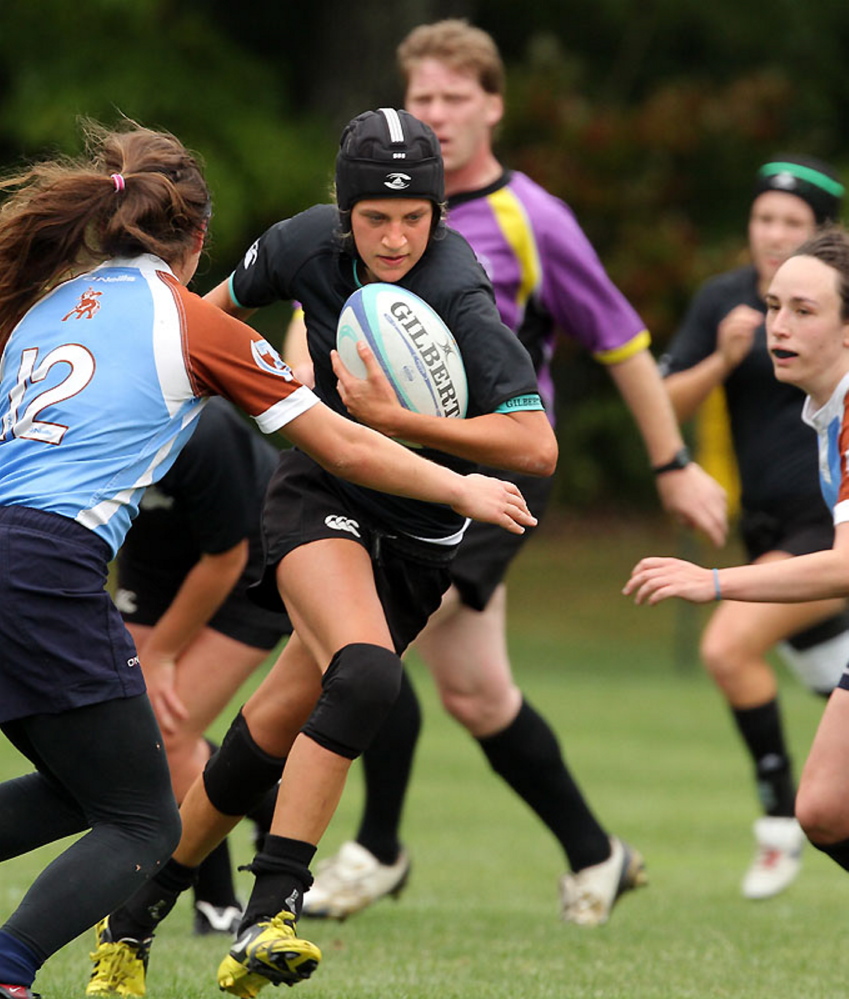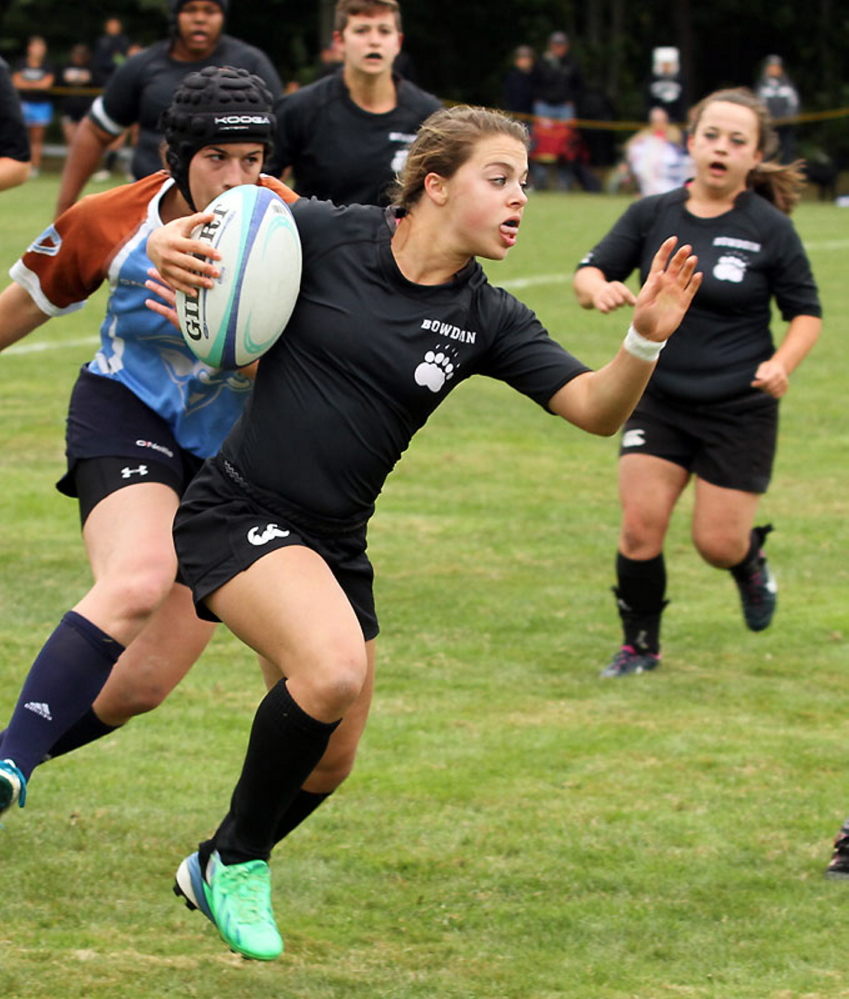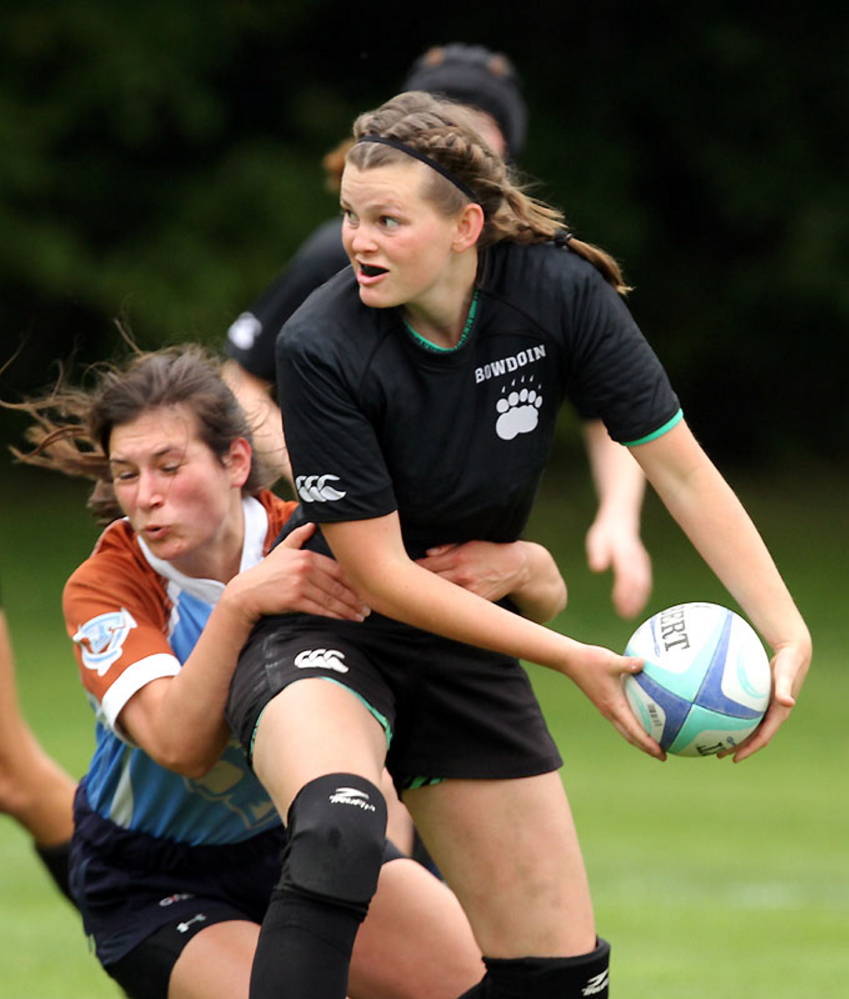BRUNSWICK — Hayleigh Kein joined the Bowdoin rugby team after being cut from another varsity sport. Anna Piotti came along after giving up sailing. Georgia Bolduc? Well, she didn’t even know what a rugby ball looked like.
They had come to Bowdoin for different sports, but were coaxed into joining the rugby community. Now Bolduc, a high school state champion sprinter at Waterville, and Kein and Bolduc, both field hockey standouts at Mount View, are part of an undefeated team two wins from a national championship.
Bowdoin plays defending national champion Winona State in the Division II semifinals at 11 a.m., Saturday in Palm Coast, Fla. If Bowdoin wins, the national championship match is at noon, Sunday.
“We have a lot of returners,” Kein said. “A lot of them are actually sophomores that are starting, but they played a lot ‘B’ side last year, and started ‘A’ side as well. So we’ve got more experience, even though we’re young. We’re also very closely knit. I think we connect really well, and we all have so much fun. I’ve always believed that the more fun you have on the field, the better you’re going to play.”
When Kein talks about ‘A’ side and ‘B’ side players, it’s much like varsity and JV. That’s part of the appeal for the young women. Bolduc, for instance, went from playing the sport for the first time last year as a freshman to starting on the ‘A’ side this fall.
“That’s one of the things that keeps many, many players,” said Piotti, who is several inches taller than Bolduc. “All of us played ‘B’ side our first year, but then our second year, we’re full ‘A’ side players. That’s pretty empowering to be any type athlete, (in) one year you are a varsity player at a college level. I think that also just speaks to a way to empower all women, that you don’t have to fit the model of the perfect athlete, the perfect 5-7, sort of lanky, lean thing. You don’t have to look like that to be a varsity athlete at a collegiate level.”
As a senior at Mount View, Kein was a finalist for the Miss Maine Field Hockey Award, given annually to the top senior player in the state. She contributed as a freshman at Bowdoin, but then had her field hockey future decided for her.
“To be honest, they cut me my sophomore year,” Kein said. “But I did not enjoy my freshman year. The girls were very nice, and the team was very good, but it was just a very different team from Mount View. It just really wasn’t my thing anymore, and so it ended up being for the best.
“It was probably one of the hardest moments that I’ve ever had to deal with, not having ever been cut from any sport,” Kein said. “But then MaryBeth, our coach, e-mailed me, asking me if I wanted to come try rugby. I felt like I at least had to show up to practice, even though I was thinking there was no way I’m ever going to play a contact, tackle sport.”
Kein, now a senior at Bowdoin and a third-year rugby player, is a defensive specialist and brings her above-average athleticism to the table in many forms. She leaned on that athleticism early on, as she tended to play rugby like a cheerleader who peeks at her teammates while performing because she doesn’t have the routines down.
“I’m still not comfortable with all the rules,” Kein said. “My first year with the team was pretty much, ‘Oh, I’ll run and chase and pass. I did not really know what went on.
“And then when I started my second year, I had to learn very fast to at least react to what was happening around me. If I didn’t know exactly what call it was, I could react to how everybody else reacted to it. So now I know most everything — I think. But only playing for three years, you can’t know everything. I’m pretty comfortable most of the time now.”
“She brings that level of work ethic and integrity to her sport that allows her to be a pretty substantial role model,” Bowdoin coach MaryBeth Mathews said. “She’s also very fun-loving. But I think that kind of a background helps others look and say, ‘OK, if she can do that, I can do that.’ What someone like Hayleigh can show is, it is a commitment, but it’s so worth it — I put my time into it, and you should, too.”
Bolduc is both a wing and a scrumhalf, a position Mathews likens to a quarterback in football. It took Bolduc some time to enjoy rugby, but the team’s camraderie carried her through that stage.
“I love our team very much,” Bolduc said. “I actually hadn’t fallen in love with the sport at the beginning of last year. But I really loved the team. Now I love the sport, also.”
“I can’t even talk about Georgia without smiling,” Mathews said. “Georgia is probably one of the most positive, fun people I’ve ever met. Optimistic, positive, does anything. So coachable. When she joined the team, and we saw her speed, and just her athletic skills, we saw this huge potential. But it’s her attitude that is so endearing. She’s so coachable. What she brings to the team is this positive, dynamic spunk. She just keeps going and going.”
Like Kein, Bolduc still competes on the track and field teams at Bowdoin. She giggled when asked what her track coaches think of her playing a heavy contact sport like rugby.
“I think they’re a little concerned that maybe I’ll get injured,” Bolduc said. “But they’re generally very supportive of it. They understand that I really love rugby. Obviously, we’re a very successful team. We’re doing something right.”
Piotti planned on continuing her athletic career by sailing at Bowdoin (yes, Bowdoin has a sailing team, and it had 27 students on its roster this fall).
“I had sailed my whole life, and I was not confident in my other sports that I played in high school that I was ready for a college-level varsity sport,” Piotti said. “So I said, ‘I’m gonna sail.’ I spent two weeks sailing here, and I said, ‘Wow. This is not a sport that I want to be part of. I need to run. I need a team to depend on me.'”
As Piotti describes it, some girls on the floor of her dorm told her how great it is to play rugby. Piotti found a girl she thought looked like a good player, and asked whether she should give up sailing for rugby. When the player enthusiastically said yes, Piotti joined the team.
“I had no idea what the sport was,” Piotti said. “My dad likes to joke around with me and say, ‘Anna thought it was the same thing as polo.’ I stuck with it. It was sport that I could run. It was a sport I had a team. It was a sport with a coach who loved her players. That was what I needed.”
Piotti, a junior who speaks three languages, was named New England Small College Rugby Conference Player of the Year last season, and led the Polar Bears in tackles. She’ll also be found doing little things to help the team, both during games and at practices.
“In a game I probably tackle like 30, 40, 50 people — or at least trying to tackle 30, 40, 50 people,” Piotti said. “And they’re full tackles. They run full at me, I run full at them, and we end up on the ground together, hopefully neither of us hurt. It’s an adrenaline rush.”
“Anna is very special because she gives her whole self to her team. She gives her whole self to everything she does, and yet she keeps her life in balance,” Mathews said. “She’s a people person, and she cares deeply for everyone on her team.”
Olivia Lopes, a Waterville grad who graduated a year after Bolduc, said the pain of playing rugby doesn’t hit you right after the game because there’s so much adrenaline, but you definitely feel it the next morning. Bolduc and Piotti both busted out laughing when told about Lopes’ description.
“It’s just awful,” Bolduc said. “You get a little beat up, for sure. A lot of people complain about their shoulders. I’m a back, so there’s a little less contact. The forwards, especially, are real sore the next day. Back. Shoulders. Sometimes people will just run into you, step on you, so you find bruises on your body. It’s what happens. Sounds barbaric, but…”
“Unlike soccer, where you sort of play a position in the sense where you play on the field, (in) rugby, all 15 of us can be anywhere on the field,” Piotti said. “So you have to continually be thinking. You have to be smart. You have to be strong. You have to be incredibly able to deal with anything that it gives you. Because, yeah, you do wake up on a Sunday and go, ‘What did I do yesterday?'”
Piotti says than no one says casually, “I play rugby.” Instead, you’re excited to meet other players, and you immediately feel like sisters. That’s partly why she and her teammates will defend the sport so fiercely.
“My freshman year, I got hit really hard, and had a very serious concussion,” Piotti said. “I don’t blame it on the sport — I blame it on myself, because I just hadn’t learned how to take a tackle at that time. Now, when someone’s coming at me, I immediately tense. I know where to lock all my muscles. So it’s also an adrenaline rush when you are about to get tackled, because you have to internally and externally protect yourself.”
“It’s not like football. Disclaimer!” Bolduc said. “I guess in simple terms, you pass the ball backwards, and you try to score tries. In some ways, it’s kind of like football, but like way cooler.”
Everyone from this area who goes on to play rugby finds themselves trying to explain to family and friends what rugby looks like. That bonds them even more with fellow players, because it’s a another shared experience, and only they understand how difficult it truly is. So maybe these three players from central Maine didn’t go looking for rugby, but it’s a gift they’ll always hold close, and never discard.
“It sounds really dangerous to outside people, and I’ve had professors who won’t come to my games, and my bosses won’t come to my games, because they keep telling me it’s so dangerous,” Piotti said. “But if you believe in yourself and you know the basics, it’s no (more) dangerous than any other sport, I think. Many, many people will disagree with me.
“I also broke my ribs this fall,” Piotti added with a laugh, “so maybe I shouldn’t be the one arguing this.”
Matt DiFilippo — 861-9243
Send questions/comments to the editors.





Comments are no longer available on this story